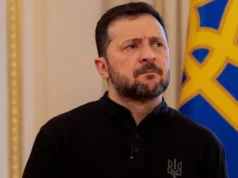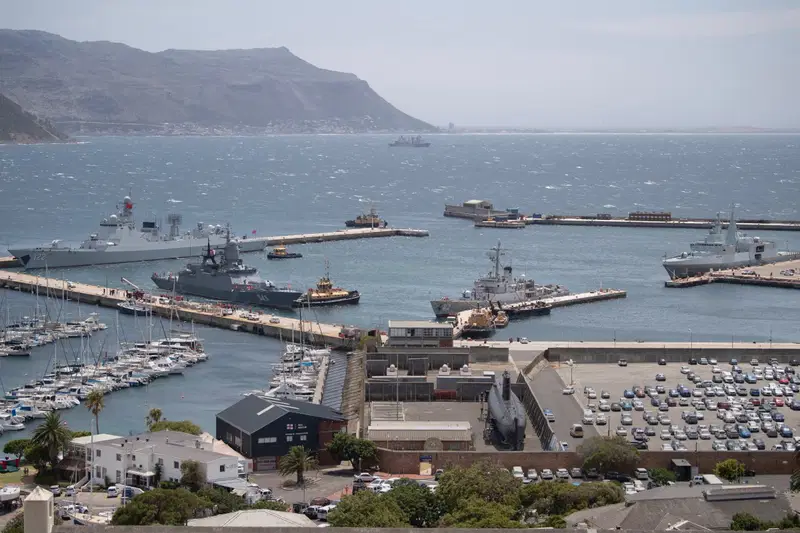UK Prime Minister, Boris Johnson has accused Russia of ‘threatening the security of the whole of Europe’ after Putin’s troops attacked the continent’s largest nuclear power plant overnight, sparking a fire that raged for hours before emergency crews were eventually allowed to extinguish it as Russian soldiers seized the complex.

Mr Johnson condemned the attack as ‘reckless’ after a phone call with President Volodymyr Zelensky who branded it ‘nuclear terrorism’. Jen Stoltenburg, who is in Brussels today to meet with NATO allies, denounced attacks on all civilian infrastructure and said the fire at the plant underlined the need to end Putin’s war as soon as possible.
Russian troops had attacked the Zaporizhzhia plant in the early hours of Friday, with CCTV capturing a fierce gun battle between Putin’s men and Ukrainian defenders that sparked a fire in a six-storey training building just outside the main complex. Moscow’s men then stopped firefighters getting to the building for several hours.
Eventually, emergency crews were allowed to go in and douse the flames before Russian troops moved in an occupied the site, which provides a fifth of Ukraine’s electricity. The UN’s nuclear monitoring agency said that, fortunately, none of the site’s six reactors had been directly damaged and radiation levels remained normal.
Moscow has, predictably, attempted to deny responsibility for the attack, saying its forces had come under attack by Ukrainian ‘saboteurs’ while patrolling the plant, who then set fire to the building themselves.
Ukraine is home to three other active nuclear power plants, one of which is located 70 miles from the city of Mykolaiv which Russian forces have begun attacking after seizing nearby Kherson. The other two active sites are located in the west and are not currently under threat, though that situation could change as the Russian attack branches out. Ukraine also has five sites which are out of action, but could still pose a risk if hit by shells.
Nuclear experts told the BBC that attacks on Zaporizhzhia were ‘frightening’, and that damaging nuclear plants risks creating a disaster similar to what happened at Fukushima in 2011 after it was hit by a tsunami – where a loss of power results in uncontrolled heating and an eventual meltdown.
Claire Corkhill, professor of nuclear materials at Sheffield University, told the corporation that the reactors at Zaporizhzhia now appear to be shutting down to remove the danger – which may have been Russia’s intention in attacking the plant.
Russia’s war against Ukraine is now entering its ninth day and shows no sign of stopping any time soon after talks between the two sides yesterday broke up without agreement, before Vladimir Putin went on TV to declare that he would keep battling for ‘total victory’ whilst spouting propaganda that Russia’s forces are not deliberately targeting civilians and that the ‘special operation’ is proceeding on time with all of its major objectives completed to schedule.
Mykolaiv, a city to the west of Kherson which is now under Russian control, came under attack on Friday morning with the mayor saying troops had moved into the outskirts. Mykolaiv is located along the road to Odessa, Ukraine’s third-largest city and main port, which is increasingly at risk of coming under siege.
The city of Mariupol, on the other side of the Crimean peninsula, also continues under heavy bombardment as Moscow’s men try to bomb it into submission – with the aim seeming to be cutting off Ukrainian access to the Black Sea to deny the government access to lucrative trading routes.
Fighting is also continuing across the north and east, with Ukrainian special forces ambushing and destroying Russian tanks and armoured vehicles at Hostomel – to the west of the city – and Brovary – to the east – late yesterday and this morning. Ukraine also claimed its jets have targeted part of a 40-mile convoy currently stalled outside the city, amid fears it would encircle the capital and bombard it.
Meanwhile Chernihiv, to the north east of Kyiv, and Kharkiv, in Ukraine’s east, were braced for more heavy shelling today after days of increasingly indiscriminate attacks including with banned cluster munitions have left dozens of civilians dead. Officials in Chernihiv said this morning that 47 people died in attacks yesterday.
President Putin is also stepping up actions on the home front, intended to head off internal dissent about the war as combat proves fiercer and harder than his generals anticipated, and western sanctions destroy large chunks of the economy.
Russia’s rubber-stamp parliament on Friday approved new laws that would see anyone spreading ‘fake news’ about the invasion jailed for up to 15 years. Putin had previously threatened and shut down radio and TV stations referring to the ‘war’ or ‘invasion’ of Ukraine – which Moscow prefers to call a ‘special military operation’.
Moscow also admitted to limiting news from outside sources getting into the country, with the BBC, Radio Free Europe/Radio Liberty, independent Russian site Meduza and Germany’s Deutsche Welle all restricted, while access to Facebook has been blocked.
Putin has also gone after peaceful protesters, with thousands arrested while marching in rallies around the country asking for the conflict to end.
Meanwhile diplomats from NATO, the EU and G7 will hold a series of back-to-back meetings today in order to discuss next steps in the crisis, with discussions expected to focus on reinforcing NATO’s eastern flank in Estonia, Latvia and Lithuania, supporting non-NATO states such as Moldova and Georgia, and calls for more military support to be sent to Ukraine.








